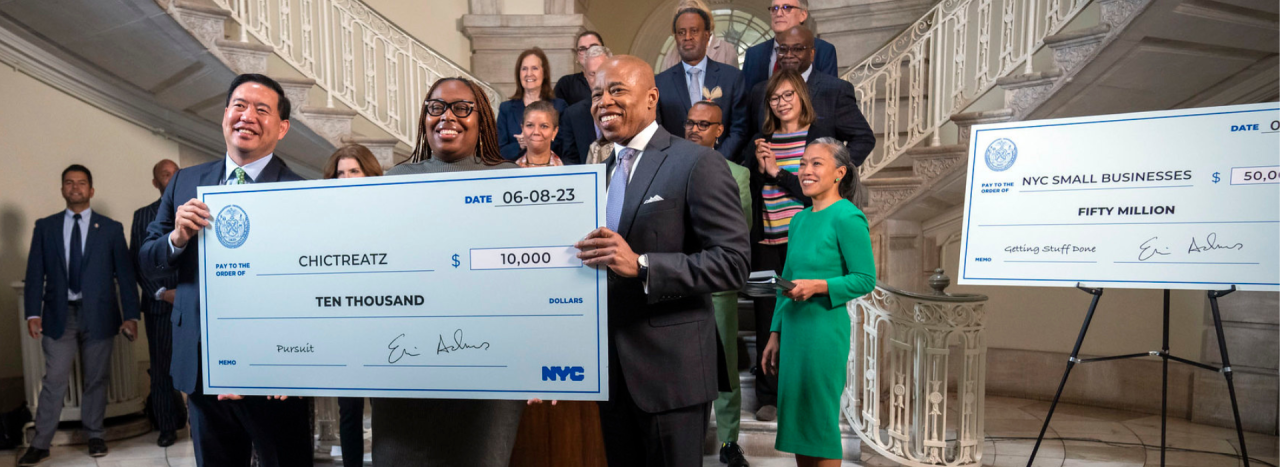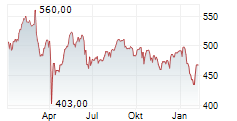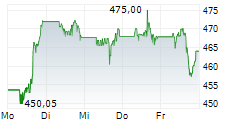
BY BEN FOX RUBIN
NORTHAMPTON, MA / ACCESSWIRE / May 23, 2024 / Mastercard
Mastercard
In 1975, Kevin Kim's mom and dad picked up their lives and brought their two kids from South Korea to New York, moving into a one-bedroom, one-bathroom apartment in Sunnyside, Queens.

Kim, who is commissioner of New York City's Department of Small Business Services, was 5 at the time, his sister was 9, and their parents were working 14- to 16-hour days, seven days a week, trying to build up their artificial flowers business. Kim's maternal grandmother moved in to help out.
Mom would create the flower designs and dad would head over to the garment district, knocking on wholesalers' doors to sell those designs. After seven years of doing that, the family finally made it out of that tiny apartment.
His parents' struggle to make it - especially because they spoke limited English and "had no clue about any government resources," he said - informed a lot about how Kim has engaged immigrant small business communities in New York City. There are over 200,000 small businesses across the city, and about half of them are owned by immigrants.
Kim's own experience as an entrepreneur, even after living in New York City most of his life, was similar - he also didn't know what government resources he could access.
"When I came into this role, the first thing that was so glaring was that - wow, this agency New York City Small Business Services has so many incredible programs already," he said in a recent interview. "And yet, if people don't know about it, it's all for naught."
He set out to make sure people just like his parents would know about SBS, which provides a long list of resources for small businesses, including funding, commercial lease assistance and government contracting opportunities.
He spoke to the Mastercard Newsroom about his work at SBS and the sentiment he's hearing in the streets from small businesses today. Kim also talked about the creation of the city's $85 million NYC Small Business Opportunity Fund - the biggest public-private loan program for small businesses in the city's history - which was created in partnership with Mastercard and Goldman Sachs. He also made sure to plug the upcoming SBS Small Business Month Expo on May 29, which will bring a variety of small business resources under one roof.
After being appointed to the position more than two years ago, Kim this month announced plans to step down at the end of June.
The following Q&A was edited for length and clarity.
You mentioned how much you wanted to focus on outreach at SBS. So how did you manage to get the word out?
Kim: I came in and we ended up reorganizing our agency to create the first-ever outreach team, and we put a team of about 10 people in there. We also put the existing RV unit, which we affectionately call Mobie, into action - that allowed it to go around the city multiple times a week.
I realized that our social media was lagging and, in this day and age, without robust social media activity, you're not going to get the audiences that you're aiming to get. The way we disseminated the programming information out to this 8.5 million-person city of 700 different languages being spoken every day became my focus.
We are clearly seeing the engagement with our agency just skyrocket. It was an intentional effort to make sure people knew that if they needed us, we were there and they knew how to get to us.
And that was all part of this grand strategy to make sure that people knew about all of our services, in language and in historically underserved communities, and that they wouldn't have to wait seven years like my parents to have a successful small business - that maybe they could cut that time in half.
What are you hearing from small businesses today - is there more optimism since the pandemic?
Kim: One of the best parts of this job is that I do get to go around to all the commercial quarters in every borough in so many neighborhoods. I ran into this small business owner, a Haitian bakery in Queens who opened during the pandemic. The fact that they were doing really well by the time I visited tells you something, right? The history, the resiliency, the hope of New Yorkers coming here with very little and starting a small business and not just helping their own family, but I know that particular business was giving back to the Haitian American community. And so it's that cycle, living the American dream right here in New York City that still exists. That just really reminded me of my own personal story.
"It's not just them living their dream, but they're really impacting the community by hiring New Yorkers as well. So it feels like everybody's chipping in, the mood out in the streets is much more vibrant."
Kevin Kim
It's not just them living their dream, but they're really impacting the community by hiring New Yorkers as well. So it feels like everybody's chipping in, the mood out in the streets is much more vibrant. I'm not trying to brush over some of the challenges that are still out there. Of course, retail theft is still out there.
The optimism, I feel it. I think the types of programs and investments the Adams administration has made, that's made a huge impact when you invest in the commercial corridors.
Tell me about the city's Opportunity Fund.
Kim: We were able to have such great private partners in Goldman Sachs and the Mastercard Center for Inclusive Growth. The design of the program was so collaborative, having discussions about not just how much money is going to go out there, but what's the biggest impact we can have.
When you come out with a loan program by a government entity, you sometimes look for the easiest way to implement it and that could have been just picking the three or four largest CDFIs [community development financial institutions, which provide financial services to low-income communities] and then just working through them and calling it a day. What was extremely impactful here was that Mastercard, Goldman Sachs, SBS - we all had that second layer of intentionality saying, if we're going to do this, and maybe it takes a little bit longer to design it and to roll it out fully, let's make sure we focus on capacity building for some of our smaller CDFIs.
And that's what we did. And that second prong to this, I think, really impacted the results we got and who got the money, because the smaller CDFIs were really rooted in historically underserved communities. So after one year of the implementation of this program, we ended up with 1,046 businesses getting an average of $80,000.
You could just see the demand that was out there, because in the first couple of weeks, we had over 10,000 businesses express interest.
The results again mirrored so much of that outreach, with 80% MWBEs [minority and women-owned business enterprises] receiving the money. We had 69% who are self-identified as BIPOC [black, indigenous, and other people of color]. We had 59% of recipients being located in low- and moderate-income communities.
Because of the success, we're already trying to think about what a 2.0 version would look like.
What's a success story from the Opportunity Fund?
Kim: We had chef Jae Lee, from a restaurant called Nowon. It is a Korean American bar and restaurant in the East Village. They became very well known on Instagram and social media for their kimchi burgers. I've tried it. It's very good.
They were trying to expand to a second location in Bushwick, Brooklyn, and the traditional bank said, "Sorry, you're not eligible." Chef Lee applied for this Opportunity Fund, got $250,000, subsequently was able to open in Bushwick - a larger space, and now he employs over 50 New Yorkers.
So what this story really highlights is that when you get the right business that gets the right capital access, again, it's not just about that business. It's about the impact of hiring those 50 New Yorkers. It's about that new, bigger location. It's about providing an experience to people in that community. And so that kind of economic impact is something that needs to be fully appreciated. So that was one of our great success stories.
Especially thinking about your parents' story, how does that make you feel that you were an important part in making success stories like Nowon's happen?
Personally, I feel as if this is one of the most rewarding experiences I've had, having the privilege of being commissioner of SBS. But I want to make it so clear that it was really the years-long effort of my capital access team and other leaders here at SBS who finally made this happen.
Originally published by Mastercard
Follow along Mastercard's journey to connect and power an inclusive, digital economy that benefits everyone, everywhere
View additional multimedia and more ESG storytelling from Mastercard on 3blmedia.com.
Contact Info:
Spokesperson: Mastercard
Website: https://www.3blmedia.com/profiles/mastercard
Email: info@3blmedia.com
SOURCE: Mastercard
View the original press release on accesswire.com



